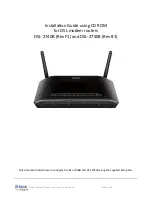
7000 Series Route Switch Processor (RSP7000) Installation and Configuration in the Cisco 7000 Series Routers 35
Reference Information
Step 5
To display the configuration register value currently in effect and the value that will be used
at the next reload, enter the show version EXEC command. The value will be displayed on
the last line of the screen display, as in the example following:
Configuration register is 0x141 (will be 0x101 at next reload)
Step 6
Reboot the router. The new value takes effect. Configuration register changes take effect
only when the server restarts, such as when you switch the power off and on or when you
issue a reload command from the console.
Bit Meanings
The lowest four bits of the software configuration register (bits 3, 2, 1, and 0) form the boot field.
(See Table 6.) The boot field specifies a number in binary form. If you set the boot field value to 0,
you must boot the operating system manually by entering the b command at the bootstrap prompt as
follows:
> b [tftp] flash
filename
Definitions of the various b command options follow:
•
b—Boots the default system software from Flash memory
•
b flash—Boots the first file in onboard Flash memory
•
b slot0: filename—Boots the file filename from the Flash memory card in PCMCIA slot 0
•
b slot1: filename—Boots the file filename from the Flash memory card in PCMCIA slot 1
•
b filename [host]—Netboots from server host using TFTP
•
b flash: [filename]—Boots the file filename from onboard Flash memory
For more information about the b [tftp] flash [filename] command, refer to the set of router products
configuration publications.
If you set the boot field value to 0x2 through 0xF and there is a valid boot system command stored
in the configuration file, then the router boots the system software as directed by that value. If you
set the boot field to any other bit pattern, the router uses the resulting number to form a default boot
filename for netbooting. (See Table 7.)
In the following example, the software configuration register is set to boot the router from onboard
Flash memory and to ignore Break at the next reboot of the router:
Router# conf term
Enter configuration commands, one per line. End with CNTL/Z.
Router(config)# config-register 0x102
Router(config)# boot system flash
[filename]
^z
Router#
The server creates a default boot filename as part of the automatic configuration processes. To form
the boot filename, the server starts with the name cisco and adds the octal equivalent of the boot field
number, a hyphen, and the processor-type name. Table 7 lists the default boot filenames or actions
for the processor.
Note
A boot system configuration command in the router configuration in NVRAM overrides the
default netboot filename.














































